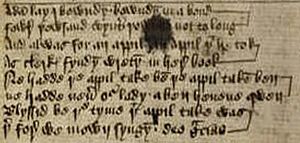Adam lay ybounden facts for kids
"Adam lay ybounden", originally called Adam lay i-bowndyn, is a Christian song text from the 1400s. It's written in a special style called macaronic, which means it mixes English with a bit of Latin. The song tells a famous Bible story from the Book of Genesis, Chapter 3, about Adam and Eve and how they disobeyed God by eating a forbidden fruit.
Even though it was meant to be sung, we don't have any of the original music. But many modern composers have written new music for it, especially for choirs. One very well-known version is by Boris Ord.

Where it Came From
The old handwritten book where this poem is found is called Sloane 2593. It's kept at the British Library and is believed to be from around the year 1400. Experts think the words might have been sung by a traveling musician or storyteller. Other poems in the same book include "I have a gentil cok" and the famous "I syng of a mayden". There are also two riddle songs in it.
A study in 2008 looked at the way the words were written and found that they likely came from the East Anglia area of England, especially Norfolk. Two other old songbooks from Norfolk also have songs found in Sloane 2593. The words of these songs were first printed in 1836 by a historian named Thomas Wright. He thought some of the songs might have been used in mystery plays, which were old plays that told Bible stories.
The Words
The poem "Adam lay ybounden" is quite short. It talks about Adam being "bounden in a bond" for four thousand years. This refers to the time people waited for Jesus to come after Adam and Eve's actions. The poem explains that all of this happened because of an apple that Adam took.
Here's what the original Middle English words look like, next to a slightly updated version:
| Original Middle English | Middle English (converted by Edith Rickert) |
|---|---|
|
Adam lay i-bowndyn,
Fowre thowsand wynter
|
Adam lay ybounden,
Four thousand winter
|
|
And al was for an appil,
As clerkes fyndyn wretyn
|
And all was for an apple,
As scholars find written
|
|
Ne hadde the appil take ben,
Ne hadde never our lady
|
If the apple hadn't been taken,
Our Lady (Mary) would never have been
|
|
Blyssid be the tyme
Therfore we mown syngyn
|
Blessed be the time
Therefore we may sing
|
The poem ends by saying "Blessed be the time that apple taken was!" and "Therefore we may sing 'Deo gratias!'". "Deo gratias" is Latin for "Thanks be to God". This part means that even though Adam's actions led to problems, they also led to good things, like Mary becoming the Queen of Heaven.
Music Settings
Even though the original music for "Adam lay ybounden" is lost, many modern composers have written their own music for it. These are often called "choral settings" because they are written for choirs to sing. Some famous composers who have set this text to music include Peter Warlock, John Ireland, Boris Ord, Philip Ledger, Howard Skempton, and Benjamin Britten. Britten's version is called Deo Gracias and is part of his A Ceremony of Carols.
A new musical version by Giles Swayne was created in 2009. It was first performed by the Choir of St John's College, Cambridge during their yearly Christmas carol service, which is broadcast on BBC Radio 3. Another setting was written by the American composer Robert Edward Smith. It was first performed in December 2018 at Trinity College in Hartford by their Chapel Singers choir.
Boris Ord
<score> \relative { \key b \minor \time 3/4 b'4. b8\noBeam a b fis4 fis2 b4. d8\noBeam cis b fis2.
} </score>
The music written by Boris Ord in 1957 is probably the most famous version of "Adam lay ybounden". It's traditionally sung after the First Lesson at the yearly Festival of Nine Lessons and Carols service. This famous Christmas service takes place at the chapel of King's College, Cambridge, where Boris Ord was the organist from 1929 to 1957.
 | Isaac Myers |
 | D. Hamilton Jackson |
 | A. Philip Randolph |

